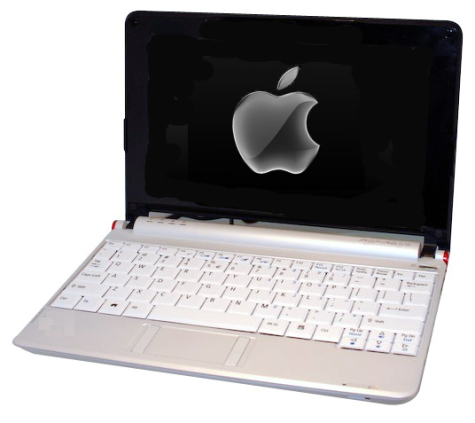Why Apple and Google need to get into the Netbook business


This crappy photo-edit of a fairly standard netbook design illustrates the power of Apple branding.
ZDNet Editor in Chief Larry Dignan recently picked up a Dell Inspiron Mini 9 Ubuntu Netbook and pinged me for tech support questions regarding his new toy -- he couldn't get it functioning on his home wireless network. We tried a couple of different combinations of things including updating the software (the usual sudo apt-get update / upgrade routine) but to no avail. He had to call up Dell Tech support, which eventually guided him through the wireless setup and helped him debug a few wireless security issues.
Click on the "Read the rest of this entry" link below for more.
Now, everyone knows that I am a big fan of Linux, especially Ubuntu. But right now, especially given typical end-user experiences like Larry's, I feel that Ubuntu Netbook Remix is probably not the ideal OS to hand to your typical netbook consumer who really just wants the device to "just work". ASUS has the right idea with using an extremely customized Xandros on the Eee PC, but I think there are two OSes which would have much more consumer appeal and would really launch netbooks into the stratosphere in terms of mass adoption.
The first, of course, is Mac OS X. Certainly, Apple could go ahead and tweak the regular Mac OS X it uses on their Macbook systems for a reduced OS footprint, and slap it in a nice pretty case and on Intel Atom reference hardware, which is the same strategy that all the other netbook manufacturers are taking with their Windows XP and Linux-based systems. However, given the huge popularity of the iPod and the iPhone, and the wide variety of applications available on the iPhone/iPod app store, it might make more sense to use a modified version of what they use for that device implementation, and adapt the iPhone/iPod reference hardware to use a larger screen and a full-size keyboard and mouse touchpad. By using the same ARM-based CPU architecture as a iPhone or iPod -- such as an XScale -- you also would have much better battery life than an Atom-based netbook as well. Symbian-based systems such as the Psion Series 7 and the Psion Netbook have used ARM-based processors for years, and despite the fact that the company no longer manufactures them and is now centered around the vertical market space, it's end user community remains very loyal.
I foresee an "iNet" as essentially a iPhone or iPod with a keyboard, a 9-inch screen, SD-HC expansion ports, and built-in wireless G or wireless-N networking with 40GB or 80GB of storage. The larger screen would allow for a more natural browsing experience with the iPhone/iPod touch browser interface, and by using adapted iPhone software, the unit is more of a digital convergence device than an actual PC that requires maintenance. Naturally, it would be fully compatible with iTunes and effectively could act as an iPod. Essentially, this would be an iPod for business execs. The Mac implementation of OpenOffice.org 3.0 could also be ported to this architecture to provide a complete end-user experience comparable to a Wintel or Lintel netbook offers, but with the advantage of Apple panache and iPod goodness. The price point? I'm thinking $400-500.
Now, this is not to say that Apple should be the only non-traditional player looking at the netbook market. Linux could be a great OS for netbooks, but I think the way it is being approached by Dell and other manufacturers is wrong. What we really should be thinking about for netbooks is Android, not Ubuntu. With Android, Google has really thought out about what should go into a digital convergence OS. It's got an excellent built in browser and its interface is as good as anything Apple has, and because it is open source, it would allow multiple manufacturers to use it. Price point of an Android netbook? I'm thinking $300 or less.
There is one caveat here, and it would have to be addressed -- currently, there's no OpenOffice port to Android's Dalvik JVM, so Google would have to get a comparable productivity solution for Java working, run a local port of Google Docs, or port X.Org to Android to make the regular OpenOffice implementation work on either ARM or x86. The x86 version of Android is rumored to be publicly available by 1Q2009, so its theoretically possible we could see Android netbooks by the end of next year.
Do you want an iPod-based or Android-based Netbook? Talk Back and Let Me Know.
